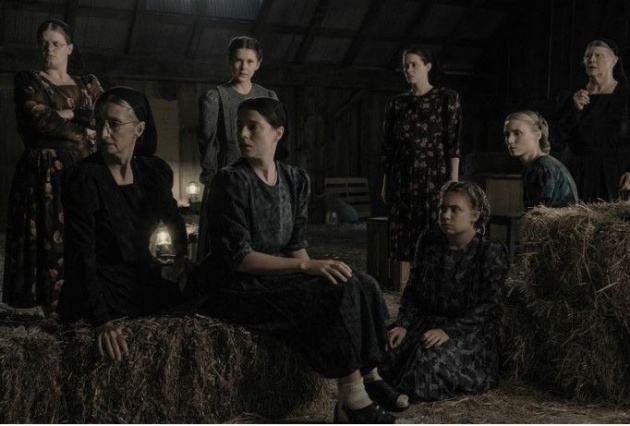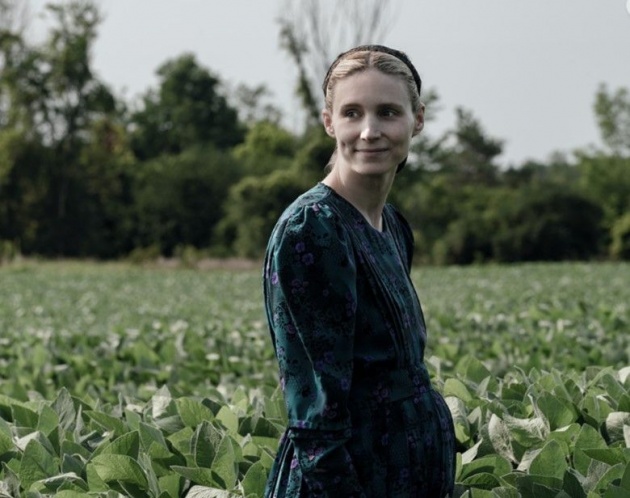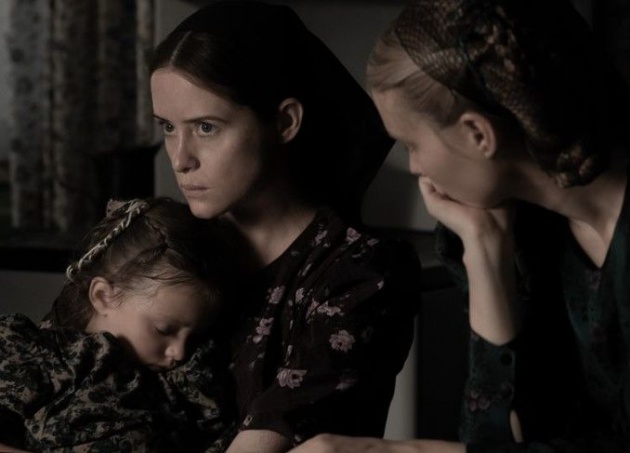
Pictured: The ensemble discuss whether to 'stay and fight' or 'leave' in the fact-based drama, 'Women Talking' adapted from Miriam Toews' novel by writer-director Sarah Polley. Photo: Michael Gibson. Courtesy of Universal Pictures (UK)
Inspired by a real-life case of serial abuse, the film Women Talking, adapted from the novel by Canadian author Miriam Toews by actress turned writer-director Sarah Polley, imagines a group of women living in a rural colony contemplating their response to being injected with cow tranquiliser at night and raped by their menfolk. The adult men in the unnamed community are entirely amorphous, unified by the violence towards women, which we deduce is borne out of entitlement – violence is never shown, only its aftermath. The community is deeply religious, though there is no church, no religious leader signing off on such action. We might perceive this community as a metaphor for the Middle East, where in many countries, misogyny to a lesser or greater degree is institutionalised. The lack of specificity here is an impediment to drama. Put crudely, there is not enough going on to hold our attention for the full 104 minutes, in spite of the cast and the premise. The one male character, August the schoolteacher (Ben Whishaw) endures a tongue lashing, enlisted as a scribe – the women aren’t taught to read or write – but absolutely forbidden to take an active part in proceedings.
The ensemble is headed by three young actresses – two British (Jessie Buckley, Claire Foy) and one American (Rooney Mara) who embody rage and compassion respectively. There’s something fleetingly amusing about two actresses who have played the same role – Mara and Foy both starred as a punk-haired cyber detective Lisbeth Salander aka The Girl with the Dragon Tattoo – appearing together as competitors in indignation. Foy’s Salome Friesen is shown early on as fury incarnate, wielding a scythe. Mara’s Ona Friesen has achieved a form of serenity. Both characters are committed to taking some form of action but are diametrically opposed in temperament. It is one of the film’s more disappointing aspects that Salome has little nuance, though when the film shifts to a debate about the age of boys who should be included in the women’s Decisive Act, she is torn as to whether her son is too old to avoid adopting the mindset of the corrupters. By contrast, Ona, as her name suggests, is honourable.
Two of the older cast members, Sheila McCarthy and Judith Ivey, transfix us, McCarthy’s Greta has a wonderful bit of business with false teeth, which she removes claiming they are too big, though the humour of the remark quickly evaporates with a flashback cutaway – and there are a few of those – to Greta’s actual dislodged teeth lying in blood on the table. Greta’s warmth and wisdom is conveyed though two anecdotes about her horses Ruth and Cheryl. The first – again shown in flashback – shows them instinctively frightened of a barking dog and steering Greta’s wagon into the crops. When Greta announces, ‘Ruth and Cheryl again’, it is almost as if she has turned herself into a literary device – human punctuation. Ivey’s Agata is a mollifying presence. She radiates certainty. One of the film’s curiosities is that though some of the characters are related, familial relationships are unclear. You rule out the characters who aren’t siblings by forms of abuse. At one point, Buckley’s Mariche Loewen calls Ona a ‘whore’, and you think, ‘they’re not sisters’.
The film has a ticking timebomb structure. The men, with the exception of August, are all in jail after one of their number was caught abusing the women – he was detained and gave up the others. We are told this twice, so we get the point. The women have two days before they return. They have three options: do nothing, stay and fight or leave. The options are illustrated by pictures under which the women enter crosses – and there are a lot of those. The ‘do nothing’ option is supported by ‘Scarface’ Janz (Frances McDormand). If the women leave or stay and fight, they will be ex-communicated and refused entry into the Kingdom of Heaven. Janz would rather endure misery in this life than forego serenity in the next. She opts out of the debate – a shame really, as McDormand has turned herself into one of cinema’s most vital curmudgeons, a firebrand of indignation, intelligent, committed, and authoritative. A few women, representing the many, gather in a hayloft to debate options two and three with August coerced as scribe, while the other women supervise young children in the fields. With this set up, I expected something akin to Twelve Angry Men. However, the morality of the situation is settled early. It’s a false choice.
At one point, the film resembles every office away day you’ve been on. ‘Let’s divide stay and fight into pros and cons,’ suggests one of the women. Pro: there is some farming equipment I’ve always wanted to use. Con: well, let’s not go there. August tries to hurry the women along and gets an earful. As I said, it’s like any office away day you’ve been on. Indeed, in an act of faux despair, one of the women throws herself from the hayloft. We’re shocked, but wait, she’s landed in a carton of hay, an indication that not all of the women are taking this process seriously. At one point, August is asked what he thinks. Hesitantly, he contorts his vocabulary into an expression of support, as if Whishaw were trying to solve a Rubik’s Cube with words. August is not like the other men. He and his mother were evicted from the colony for his mother’s radical thoughts. After she died, he returned to teach the children, but only boys because the men appear to view the Taliban as role models. Were I to consider leaving the colony, the first question I would ask August is ‘what is it like in the outside world’. You expect August to tell them about something called the internet, gas prices and a woman’s right to choose – Agata remarks that she has pushed out thirteen children. Given that the drama works primarily on the level of a fable – ‘The Fabelwomen’ if you will – such curiosity is not expressed.

Pictured: Love and Ona. Pregnant abuse victim Ona (Rooney Mara) in a scene from the fact-based drama, 'Women Talking', adapted from the novel by Miriam Toews by writer-director Sarah Polley. Photo: Michael Gibson. Still courtesy of Universal Pictures (UK)
The most intriguing character, albeit somewhat derivative, is a woman who identifies as Melvin (August Winter) and dresses as a boy. She refuses to speak, except to the children. It won’t surprise you to learn that she has one line of dialogue, though it is mumbled, so I could not work out what she said. She offers a fourth alternative. Who gives a hoot about the Kingdom of Heaven? You wonder if she chose the male guise as a response to being raped or as protection. Her silence has more weight than some of the women talking.
At one point, one of the younger women, Mejal (Michelle McLeod) slips off to have a cigarette, clearly rolling her own. It really is like every away day you’ve been on. When she has an epileptic fit, she is accused on being an attention seeker. This suggests that one of the women is projecting her own narcissism onto Mejal.
The drama gets a jolt when Mariche’s husband, Klaus (Eli Ham, seen only in long shot) returns to find something to sell in order to raise bail money for the others. In particular, he has his eye on Greta’s horses. Mariche goes home and offers herself as a sacrificial punching bag, delaying Klaus and somehow encouraging him to get drunk so that the women can execute their plan. We don’t see Mariche and Klaus together, only the aftermath, a bruised Mariche with her arm in a sling – confirmation of a call to action.
At one point, a van appears calling for the colony to register for the 2010 census. Blaring from it is ‘Daydream Believer’ by John Stewart and the Monkees. You wonder if the census advertised here takes place forty years in the future. The song offers a romanticised view of relationships, though I kept waiting for the moment when the lyrics ‘homecoming queen’ are replaced with ‘old closet queen’ as in one version. Two of the younger women approach the driver, who looks like Brad Pitt, one of the film’s producers, so you can understand their excitement. But the film introduces an ambiguity about men. This is played out in the relationship between August and the pregnant Ona. At one point, August tells her that he loves her, wants to marry her and care for her unborn child – the first image in the film is of Ona lying in bed having been violated. Ona refuses. The women’s action must exclude him. The women discuss an alternative colony. Mariche and Salome are highly resistant to men. ‘If a man harms my four-year-old daughter,’ begins Salome before describing the furious vengeance she will wreak, possibly in a yellow tracksuit with a samurai sword, not that such items are available; the women won’t have seen Kill Bill Vol. 1.

Pictured: Contemplating furious vengeance. Salome (Claire Foy) with her four-year-old daughter in a scene from the fact-based drama, 'Women Talking', adapted from Miriam Toews' novel by writer-director Sarah Polley. Photo: Michael Gibson. Still courtesy of Universal Pictures (UK)
Then there is the text that August has transcribed. None of the women can read, but August offers it to Salome, who re-joins him in the hayloft for a ‘just one more thing’ moment. She refuses. It is for the men.
Early on in the film, there is a discussion as to whether ‘to flee’ means the same as ‘to leave’. The women argue that it doesn’t. Fleeing implies victimhood. Leaving is a decisive act, in line with the women’s pacifism. (But, hey, what about that scythe?) There is bravery in the women’s action that inspires women in the ‘do nothing’ camp. Whether it results in a melee of women in print dresses taking on plaid-shirt wearing men, you’ll have to discover for yourself. The fate of Greta’s horses is in the balance in this sadly unsatisfying Best Picture Oscar nominee.
Reviewed at Curzon Canterbury, Screen One, Southern England, Friday 17 February 2023, 17:40 screening



